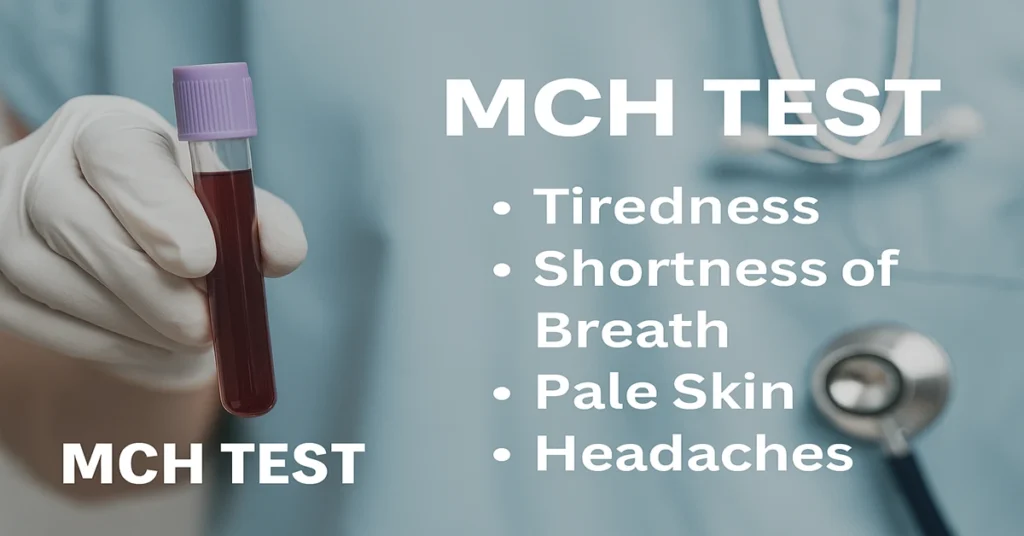What is the MCH Test?
The MCH test, or Mean Corpuscular Hemoglobin test, measures the average amount of hemoglobin inside a single red blood cell (RBC). Hemoglobin is the protein that carries oxygen in your blood. Unlike a test that counts how many RBCs you have, the MCH test tells you how much oxygen-carrying hemoglobin each RBC contains.
It is part of a Complete Blood Count (CBC) panel and is useful for identifying types of anemia. For example, in iron deficiency anemia, RBCs contain less hemoglobin (low MCH). In vitamin B12 or folate deficiency, RBCs may contain more hemoglobin than normal (high MCH).
Where is MCH Determined in the Body?
MCH is not made by the body directly. It is a calculated value based on:
- Hemoglobin level (Hb)
- RBC count
Modern blood analyzers calculate MCH using these two values. While MCH is calculated in the lab, the quality of RBCs and hemoglobin depends on how well your bone marrow is working, and on nutrients like iron, folate, and vitamin B12.
Main Functions and Importance of MCH
Measures Hemoglobin Content: Shows if RBCs have enough hemoglobin to carry oxygen.
Classifies Anemia:
- Low MCH (Hypochromic): Less hemoglobin in cells, often due to iron deficiency.
- High MCH (Hyperchromic): More hemoglobin in cells, often from vitamin B12 or folate deficiency.
Used with MCV and MCHC: Together, these values give doctors a clearer picture of blood disorders.
Causes of Low MCH (Hypochromic Anemia)
Low MCH usually points to anemia where red blood cells look pale (less color). Causes include:
- Iron Deficiency: Most common cause.
- Chronic Blood Loss: From ulcers, surgery, heavy periods, or hidden bleeding.
- Thalassemia: A genetic disorder affecting hemoglobin.
- Lead Poisoning: Interferes with hemoglobin production.
- Chronic Kidney Disease: Reduces erythropoietin, leading to fewer healthy RBCs.
- Poor Diet: Not enough iron-rich foods.
Symptoms of Low MCH
- Feeling tired or weak
- Pale skin or lips
- Shortness of breath
- Frequent headaches
- Cold hands and feet
- Fast heartbeat
- Dizziness or fainting
Causes of High MCH (Hyperchromic Anemia)
High MCH means each RBC has more hemoglobin than normal. Causes include:
- Vitamin B12 Deficiency
- Folic Acid Deficiency
- Liver Disease
- Alcohol Abuse
- Hypothyroidism (underactive thyroid)
- Certain Medications: Some chemotherapy or HIV medicines
Symptoms of High MCH
- Constant tiredness
- Difficulty focusing
- Numbness or tingling in hands and feet (B12 deficiency)
- Red, swollen tongue (B12/folate deficiency)
- Pale or yellowish skin
- Mood swings or memory problems
Reference Ranges
(may vary by lab)
Normal MCH: 27 – 33 picograms (pg) per cell
Low MCH (< 27 pg): Often iron deficiency
High MCH (> 33 pg): Often B12 or folate deficiency
Sample Type
- Sample Taken: Whole blood
- Tube Used: Lavender-top EDTA tube
- Blood is drawn from a vein in the arm. Results are available as part of the CBC report.
Test Preparation
- Usually no fasting is needed.
- Stay hydrated — dehydration can affect results.
- Tell your doctor if you are on chemotherapy, anti-HIV drugs, or alcohol consumption is high.
- Sometimes, doctors order MCH with other tests like vitamin B12, folate, or iron studies for clarity.
When to Consult a Doctor
- If you often feel weak, dizzy, or unusually tired.
- If you have pale or yellowish skin.
- If your CBC shows MCH levels consistently below or above normal.
- If you have numbness, tingling, or memory problems (possible B12 deficiency).
- If you have family history of anemia or blood disorders.
~END~

